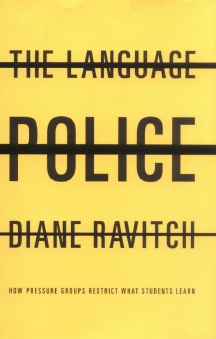
The Language Police: How Pressure Groups Restrict What Students Learn by Diane Ravitch. Published by Knopf, 2003. 272 pages.
While working under the administrations of both George H. W. Bush and Bill Clinton, education historian and researcher Diane Ravitch came to realize "that educational materials are governed by an intricate set of rules to screen out language and topics that might be considered controversial or offensive." According to the author, "some of this censorship is trivial, some is ludicrous, and some is breathtaking in its power to dumb down what children learn at school."
Language Police contains examples of textbook passages screened by pressure groups from the political right and left for language and topics on "forbidden" lists and standardized test questions that are generic in locale and devoid of "potentially offensive" wording. Ravitch contends that the resulting educational materials lack literary quality and historical accuracy. The author's research findings illustrate what she terms "the great irony of bias and sensitivity reviewing" that began with the hope of encouraging diversity, but evolved into a bureaucratic system that "reduces everyone to interchangeable beings and makes nonsense of literature and history along the way."
Ravitch's work gives educators and parents much to think about and concludes with suggestions for restricting the current influence of pressure groups on educational content.
Jan Militello
